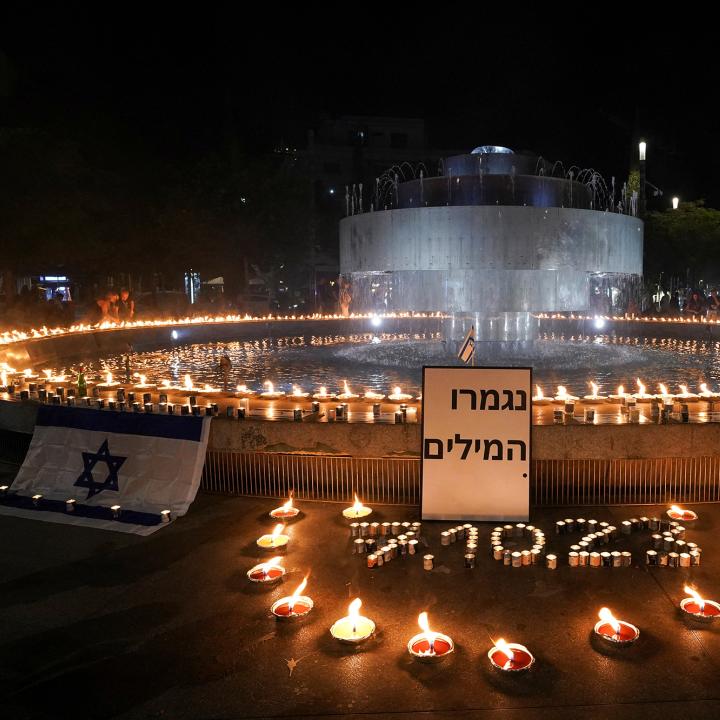
- Policy Analysis
- Articles & Op-Eds
Why 10/7 Was Worse for Israel Than 9/11 Was for America
Also published in New York Daily News

In its scope, depravity, and national reach, the Hamas assault was a much greater shock to Israelis, and their response should be viewed through that lens.
“Israel’s 9/11.” This brief phrase has now become the short-hand reference point to explain the catastrophic shock, horror, surprise and enormity of the Hamas terrorist attack Israel suffered on Oct. 7. From friends of Israel, it is said with sympathy and reverence. For Israel’s enemies, it is cited as a great achievement.
But it is inadequate and misleading. For Israelis, 9/11, in all its horror, doesn’t begin to describe what happened on 10/7.
Consider this:
- Numbers: By latest count, the attacks by Hamas—the Arabic acronym for the Islamic Resistance Movement—killed more than 1,300 Israelis and third-country nationals, including at least 29 Americans, in a country whose population is less than 10 million. In America, that would be equivalent to killing nearly 40,000—13 times more than the number of Al Qaeda victims on 9/11.
- Intensity: As terrible as 9/11 was, tens of millions of Americans woke up the following morning in our vast country not knowing any of the victims or their families. In Israel, a country whose width is less than the daily commute of many Americans, not a single family was untouched by the attack, either directly, through a neighbor, friend or classmate.
- Terror rockets: On 9/11, millions of Americans gathered around televisions in the safety of their homes, schools and work sites in growing shock and anger as they watched the twin towers fall, one after the other. Many Israelis didn’t have that luxury, since Hamas complemented the butchery of communities in Israel’s south with the launching of thousands of rockets and missiles against Israel’s coastal mid-section, in an effort to terrorize the population and drive them to shelters.
- Individual barbarity: As difficult as it is to say, 9/11 was—at its core—an example of mass killing, hundreds murdered in a series of single horrific acts, the smashing of airplanes into buildings, triggering their collapse. On 10/7, Hamas terrorists perpetrated hundreds of individual, purposeful acts of barbarism—executing babies, murdering parents protecting children, raping women as corpses of their friends lay beside them. The images of individualized inhumanity—face to face between the perpetrator and the victim, often recorded live on film or audio—will never fade.
- Hostages: Never before in the history of the century-old Arab-Israel conflict has one side taken mass numbers of civilian hostages across borders, with the composition of the hostage group—children, women, elderly, mentally ill—especially outrageous. This will drag out the after-shocks of the original act of terror, perhaps ending in further tragedy. Americans sadly recall how the taking of a much smaller number of hostages—diplomatic personnel at the American embassy in Tehran—paralyzed the U.S. government and dominated daily life in our country for 444 days. Obviously, the hostage factor was never a component of 9/11.
All of this, taken together, is the backdrop to decisions the Israeli government is now taking regarding war against Hamas and defense against broader regional escalation. On its southern and northern borders, Israel faces radical Islamist extremist groups—Hamas and the Lebanese “Party of God,” Hezbollah—each supported, financed, trained, supplied and, to a certain extent, commanded by the Islamic Republic of Iran. That the Sunnis of Gaza could align with the Shiites of southern Lebanon under the leadership of the Shiite ayatollahs in Tehran is a testament to their willingness to set aside doctrinal differences for their common fight not just to prevent the hopeful prospect of Saudi-Israel peace, but to kill Jews and take a giant leap toward the goal of destroying the Jewish state.
Israel’s immediate task is huge. At one level, it is to decapitate Hamas military leadership and destroy the enemy’s residual military capability. But on a deeper level it has two vital objectives: to rekindle confidence in the Israeli people that their government and army provide for their security and to replace in the minds of regional actors—friends, foes and would-be friends—the perception of Israeli vulnerability that was produced by the attack with the idea of Israeli dominance and invincibility. All this points to a substantial military effort that will be long, brutal and bloody, complicated by the wildcard of the approximately 150 hostages held by Hamas.
When we faraway Americans judge Israeli actions from the relative safety of a country with democracies on our northern and southern borders and broad oceans both east and west, we need to think back to the sense of outrage and mission that animated every American 22 years ago and multiply it by 10, 20 or more. That’s because Israelis suffered a catastrophe that was, for them, much worse than 9/11—in all its horror, depravity and evil—was for us.
Robert Satloff is the Segal Executive Director at The Washington Institute. This article was originally published on the New York Daily News website.



